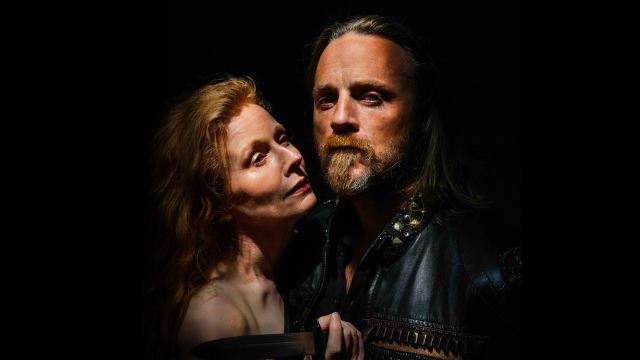Macbeth
From the moment the hero warrior Macbeth (Hugh Sexton) returns to his castle, already Thane of Cawdor, the words of the Witches running in his head, and his childless wife, Lady Macbeth (Alison Whyte) sweetens her bullying and blackmail with passionate kisses, we know where this will lead.
It’s a production that makes no concessions to modernity. Director Glen Elston gives us what some might call a ‘conventional’ take on the play: there is no updating, no camouflage uniforms, no machine guns, no telephones, no teen nymphet witches. The kingdom Macbeth usurps is ancient Scotland, not a corporate or a crime empire. In its way, this is something of a relief: we don’t have to adapt to any diminution of the enormity of Macbeth’s crime: killing Duncan, the anointed king, is worse than murder; it is a crime against Nature, against God. Almost as much a crime is that the murder is a violation of the customs of hospitality: Duncan is murdered under Macbeth’s roof.
When the play begins in the Botanic Gardens, it is still just on dusk. But the three Witches (Annabelle Tudor, Madelaine Mason, Claire Nichols), given full rein, their text unedited, set the tone and as night falls and the surrounding trees are eerily lit, an atmosphere is established that overcomes our sitting on a lawn (and on my night, intermittent rain.) The drama plays out on a multifunctional stage designed by Mr Elston: ramps either side, several levels of stage platform, and the suggestion of a castle and battlements. Lighting, again by Mr Elston I assume, heightens the sense of impending doom. The costumes by Karla Erenbots are medieval with sweeping, swirling cloaks and tufts of fur, more suggestive (c.f. Game of Thrones) than real.
This is a play in which the word or the concept ‘man’ recurs over and over – man as warrior, man as rightly ambitious – or no man at all - man without conscience or regret, man in sharp contrast to women – who weep and ‘give suck’. Mr Sexton is handsome and charismatic, convincing as a warrior (we are reminded of that at the climax), but he also manages the paradox Shakespeare has created: despite the magnificent poetry of Macbeth’s soliloquies, he is at the same time a man of limited imagination, credulous, all too easily led, whose ambition stopped at being king – and then no more than staying king – and, as we learn, a very bad king at that – and thus one foul deed leads inexorably to the next.
As an insightful friend remarked afterwards, Macbeth is like detective story told from the inside: we watch the cause and effect that a detective might discover from the point of view – and degeneration – of the perpetrators. Whether it’s due to the charisma of the actors or by design (surely both), the marriage, the bond, of Macbeth and Lady Macbeth is at the heart of this production. Hugh Sexton and Alison Whyte project a sexuality and an accustomed intimacy even when discussing murder. At the risk of being politically incorrect, we can’t ignore that Ms Whyte is a very sexy Lady Macbeth. Yes, she is poisoned and made ruthless by ambition, not foreseeing the consequences, but we do believe Macbeth can’t help but do as she urges. Later, she will recoil, be dismayed as she realises the necessity for more murder, realises how they are ‘steep’d in blood so far’, that ‘a little water’ won’t clear them of this deed. Their marriage turns sour and alienated. When she dies, her husband, absorbed in his own guilt, gives her the flat epitaph, ‘She should have died hereafter.’
The murderous power couple is surrounded and supported by players who bring their roles to life – and speak their lines comprehensibly and clearly – they understand what they are saying (not always the case). An instance of something ‘modern’ – or less conventional – is an attempt to bolster the comedy when the drunken Porter (Kevin Hopkins) engages the audience directly (it doesn’t work, it’s too late and too far out of keeping). Another is the casting of Anna Burgess as Malcolm. We soon get used that, however, since Ms Burgess has a long stride and a most regal don’t-mess-with-me air which verges on dangerous. When Malcolm gives an order, it is with authority, and when Malcolm tests Macduff (Syd Brisbane) with a catalogue of vices and corruption, the pretence is convincingly vile.
Dion Mills is a stately and gentle Duncan and, later, he is the wary Doctor unable to treat or explain Lady Macbeth’s madness. Lady Macduff has one scene, but Shakespeare’s text and Elisabeth Brennan’s sprightly playing makes her so adorable that her murder is all the more horrific. Tony Rive’s Banquo is simply immediately likeable, completely convincing as Macbeth’s best mate – and so again, when he must be killed, the betrayal is acute. Syd Brisbane gives Macduff a dogged solidity, but he is heartbreaking when he learns of the murder of his wife and children. I came close to tears: his stricken face and crooked stance is deeply moving, and he stops the play for a moment of aching silence.
The Australian Shakespeare Company give this Macbeth a fine run, with its clarity and its unashamed accent on emotion. I’ve seen a number of plays performed in Melbourne’s Royal Botanic Gardens; this Macbeth is easily the best.
Michael Brindley
Subscribe to our E-Newsletter, buy our latest print edition or find a Performing Arts book at Book Nook.

